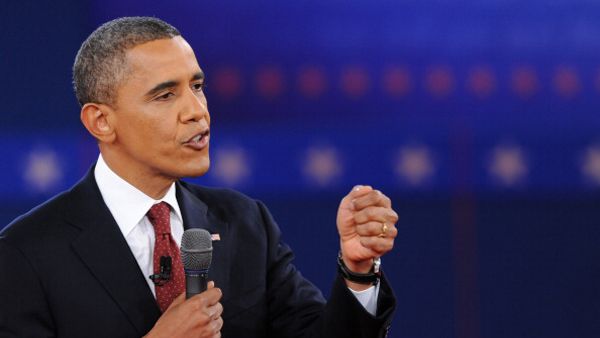Pills and Pocketbooks: Why Obama's Debate Pitch to Women Matters
These are not just women's issues, said a much feistier Obama during last nights presidential debate. These are family issues. These are economic issues.


"These are not just women's issues," said a much feistier Obama during last night's presidential debate. "These are family issues. These are economic issues."
The president was referring to the services Planned Parenthood provides: mammograms, cervical cancer screenings, and of course, contraception. He was pointing to the provision in his health care bill, which mandates insurance companies to provide contraceptive coverage. He said that women's health was a "pocketbook issue," that "one of the things that makes us grow as an economy is when everybody participates and women are getting the same fair deal as men are."
It was a night that appeared to be reserved almost exclusively for the ladies, with Obama clearly dominating; he praised Planned Parenthood five times, mentioned the childcare tax credit, and compared his grandmother to Lilly Ledbetter, while Romney put down (black, urban) single "parents" (mothers) and spawned a gleeful meme by bragging about his "binders full of women." But Obama's effective segue from equal pay to women's health stood out as one of the the most lucid, politically intelligent answers of the debate, delivering a huge blow to the farce that social issues are boutique concerns relegated to home and church.
The assertion that reproductive rights are intimately connected to a woman's financial future is a new talking point for Obama, one that's seriously overdue. Through the recent battles over Planned Parenthood's funding, over fully-covered birth control and pre-abortion transvaginal ultrasounds, both liberals and conservatives have whined that these lady problems are distracting from the "real" issues like jobs, taxes, and the deficit. The elephant in the room has always been that one hinges on the other.
The cost of birth control—and not just any old $9 generic pill at Target, but the method that works for your body—is onerous for one out of three women. Even $25 a month is a lot for
someone making minimum wage; "money out of that family's pocket" is how Obama put it last night. Having access to birth control and cheap health care "makes a difference in terms of how well and effectively women are able to work," the president explained. Whether they can "earn a living for their family." Not that Obama or Romney would dream of making this connection on national television, but the same holds true for abortion access. Many women get abortions because a child (or another child) would severely limit their financial options.
Romney knows women are struggling—he repeated several times last night that 580,000 women had lost jobs in the last four years—and he has his wife, Ann, on the campaign trailing
assuring mothers that she feels their pain. But he has yet to acknowledge that women need more than the free market and a binder to succeed in the workforce; they need to be in charge of their own bodies. They need free childcare and guaranteed maternity leave, too, issues that are virtually absent from any candidate's agenda. Obama may not be willing to go that far yet, but at least he's finally made a pitch to women that addressed "pocketbook issues" and "Planned Parenthood" in the same breath. Better late than never.
Get exclusive access to fashion and beauty trends, hot-off-the-press celebrity news, and more.
Nona Willis Aronowitz is an editor and writer who thinks a lot about love, sex and politics. She tweets at @nona.
